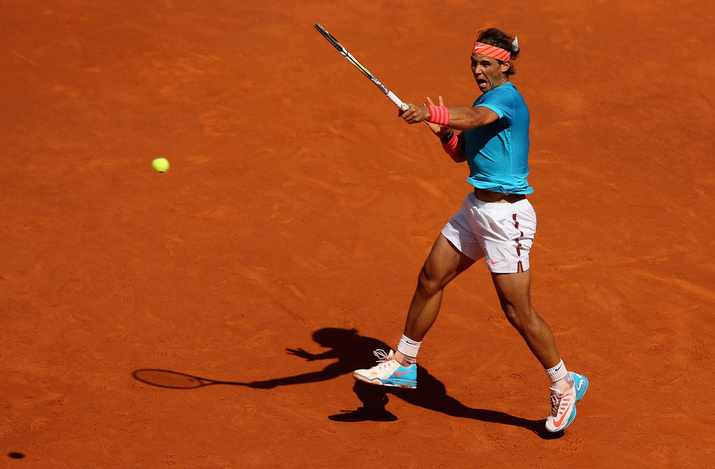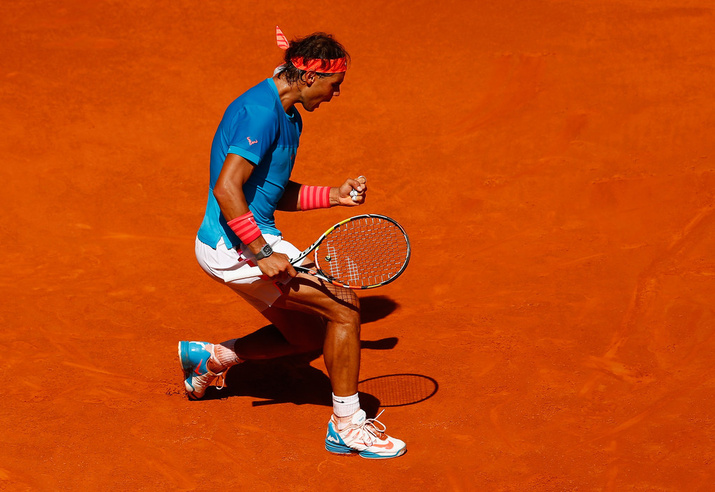Don't miss any stories → Follow Tennis View
FollowFrom Barcelona to Madrid: Rafael Nadal's Resurgence
Two weeks ago, Rafael Nadal thudded down into his seat in the modest Barcelona press conference room after falling in two lousy sets to Fabio Fognini. With one eyebrow firmly pointing upwards, the Spaniard began verbally tearing his game to pieces in a manner that had never been seen before. His beloved forehand was the subject of a special brand of scorn that afternoon. It was “vulgar,” he said in one answer. In another, “it wasn’t worthy of my ranking and my career.” he melodramatically exclaimed. It certainly slept on the couch that night, and the poor forehand couldn't have been blamed had it had slipped off into the dead of night and ran away, never to be seen again.

In a Madrid semifinal against Tomas Berdych, we can officially confirm that it did no such thing. According to the statisticians, 22 winners flew from the newly reinstated old racquet of Rafael Nadal, and 16 of them came from the forehand side. But the match seemed to play host to double, triple that amount. From the very first point on his serve when the Spaniard whistled a forehand down the line, the floodgates opened and the famous forehand down the line rolled into view, slowly picking up steam. It engineered his first break point opportunities, it drove him to set points in the first-set tiebreak, and by the second set it was an exhibition of never-ending forehand winners.
Confidence has been one of the words most frequently littering his press transcripts in these recent bitter months, but it seems there may be a light at the end of the tunnel. Along with the non-stop traffic of forehands whistling down the line, there were other hints of Nadal's returning belief. On return, against Berdych's booming serve, he took up a far more aggressive court position than expected, moving forward behind them and shortening his swing to contact the ball in front. By the end, he had even worked through the issues on his backhand side, burning Berdych when the Czech tried to seek respite in his weaker wing. You could see his relieved arms reaching further and further with every backhand follow through, the autonomy and control over his strokes returning, the confidence on its way.
After the match, Nadal was taken back to that moment when it appeared four months of mediocrity had finally caused him to snap and throw acid spit towards his favoured shot. In English he was asked if he regretted the remarks, if they were a little too harsh. The eyebrow rose again.
“When I was in the press conference of Barcelona I have been honest. I am honest today about what are my feelings, no?” he said.
“In Barcelona, my real feeling and the real thing is I played a terrible match; I lost second set having three times a break for me, so I played at very low level. That's what happened there. I said that in the press conference. I was not too hard with myself. I was honest with myself.”
Being Rafael Nadal must surely be an interesting experience. For years, he has been the person who, if critics are to be believed, shies away from making any categorical statements about his tennis and game. When the tedious and pointless question of favourites comes up, it's never him. When he is asked about his supremacy, it's always understated. Even when he loses, he manages to find some positive.

But this year has been different. These struggles - these new struggles that for once are solely down to his game and mentality rather than an injury – have galvanized a shift in his comments. Earlier in the year, when he was losing matches solely down to his abysmal play on important points, he was candid about his nerves, his lack of confidence, and his desperate need to accept his lowly level and build from there. Many rolled their eyes at the Spaniard, an apparent drama queen with a “woe-is-me” kind of attitude.
Two weeks ago, when his forehand and game looked a sorry excuse for his game in the past, this is precisely what he called them. There was no beating around the bush, no white washing his play. He was just being honest with himself, but his honesty evidently didn't go down too well, either.
After his first victory, I asked Rafa about these fruitless weeks and the extent to which this fragile mortality of 2015 has felt alien to a player whose career bore fruit from an incredibly young age and whose (many) injury comebacks have always been easily navigated. He responded in a manner unique from any player, and with sentences that could have innocuously been slipped into a book about the meaning of life.
“(Tennis is) all about moments, and all the moments are different. Different feelings, different situations on the career of everyone. You have to pass all these moments…..if I had success during 11 years, why can't I have success again if I am motivated enough? I am fit; I don't have injuries; and I cannot forget to play tennis in six months.”
It would appear that Nadal is on the verge of passing the most recent moment. And with the Madrid final this week and the French Open beyond, many more await.










